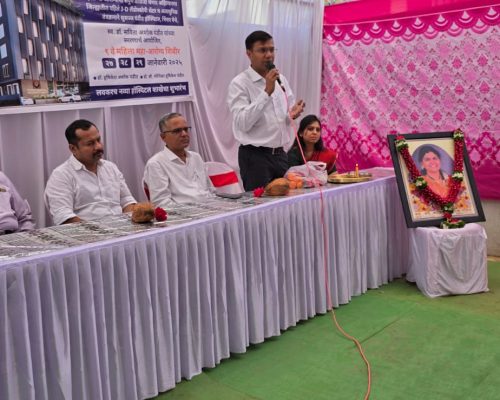Social Work
Dedicated to Serving the Community –
Dr. Hrishikesh Pandit and Pandit Hospital, Bhingar
At Pandit Hospital in Bhingar, Dr. Hrishikesh Pandit is at the forefront of a remarkable initiative to provide quality healthcare to the underprivileged. Driven by a deep sense of social responsibility, the hospital conducts a Charitable OPD weekly, ensuring that even the most financially challenged individuals have access to essential medical care. Additionally, every January, in memory of the late Dr. Savita Ashok Pandit, the hospital organizes a Yearly Mega Health Camp for Women, which has been a beacon of hope for the community for the past nine years.
During these health camps, women receive comprehensive care, including gynecological laparoscopy surgeries at a nominal cost covering only medicines and materials. With the support of all major insurance panels, the initiative has facilitated over 500 successful surgeries, providing life-changing treatments to those who otherwise might not afford them. Dr. Hrishikesh Pandit and his dedicated team firmly believe in their mission: “For us, every life counts.” Pandit Hospital continues to stand as a testament to the power of compassion, ensuring that healthcare reaches every corner of society.

महिला महा-आरोग्य शिबीर 2017

महिला महा-आरोग्य शिबीर 2018

महिला महा-आरोग्य शिबीर 2019

महिला महा-आरोग्य शिबीर 2020

महिला महा-आरोग्य शिबीर 2021

महिला महा-आरोग्य शिबीर 2022

महिला महा-आरोग्य शिबीर 2023

महिला महा-आरोग्य शिबीर 2024
Dr. Hrishikesh Pandit : Best Laparoscopic Surgeon | LET’S SEE OUR INTRO VIDEO
FAQ
You should consult a doctor during the first 6 to 8 weeks of your pregnancy, or when your period is 2 to 4 weeks late.
If your contractions are 5 minutes apart, lasting for 1 minute, for 1 hour or longer, it’s time to head to the hospital.
Doctors recommend an infertility evaluation if you have not gotten pregnant after 1 year of having regular sexual intercourse without using birth control. If you are older than 35, an evaluation is recommended after 6 months of trying.
Yes, You can. But most babies need 39 weeks to develop fully. Induced or planned delivery before that time—without a valid medical reason—is not in the best interest of the baby or the mother. After 39 weeks you can plan delivery.
Women who are 21 to 29 should have a Pap test alone every 3 years. HPV testing alone can be considered for women who are 25 to 29, but Pap tests are preferred. Women who are 30 to 65 have three options for testing. They can have a Pap test and an HPV test (co-testing) every 5 years. They can have a Pap test alone every 3 years. Or they can have HPV testing alone every 5 years.
Laparoscopic hysterectomy is a safe and suitable procedure for chosen patients. It affords patients advantages like less peri-operative morbidity, better life quality, shorter hospitalization time, and faster return to activity.
Schedule a doctor’s visit if you have: Greenish, yellowish, thick or cheesy vaginal discharge; Strong vaginal odor; Redness, itching, burning or irritation of your vagina or the area of skin that surrounds the vagina and urethra (vulva); Bleeding or spotting unrelated to your period.
Painless delivery can be achieved using a form of regional anesthesia that provides pain relief during natural labor. Epidural anesthesia is administered through an injection on the lower back of the mother. The drug takes about 10-15 minutes to take effect.
Even in severe cases of endometriosis, most can be treated with laparoscopic surgery. In laparoscopic surgery, your surgeon inserts a slender viewing instrument (laparoscope) through a small incision near your navel and inserts instruments to remove endometrial tissue through another small incision.
The HPV vaccine is recommended for routine vaccination at the age of 11 or 12 years. (Vaccination can be started at age 9.) It is also recommended that vaccination for everyone through age 26 years if not adequately vaccinated when younger. HPV vaccination is given as a series of either two or three doses, depending on age at initial vaccination.

